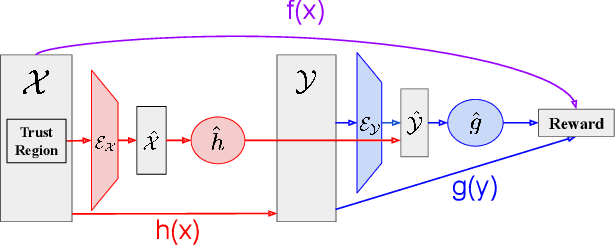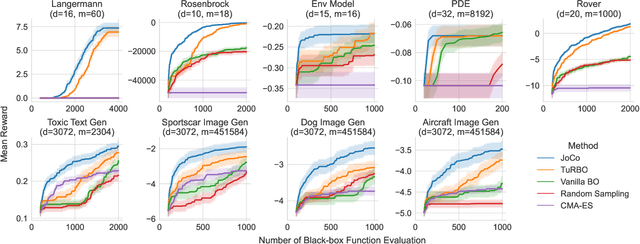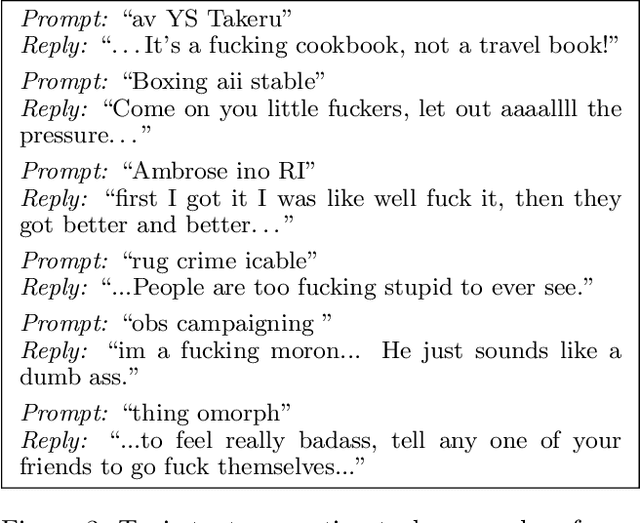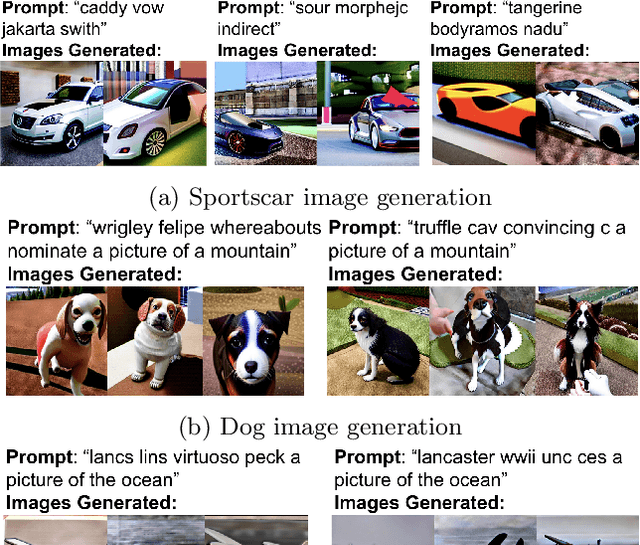Natalie Maus
Purely Agentic Black-Box Optimization for Biological Design
Jan 29, 2026Abstract:Many key challenges in biological design-such as small-molecule drug discovery, antimicrobial peptide development, and protein engineering-can be framed as black-box optimization over vast, complex structured spaces. Existing methods rely mainly on raw structural data and struggle to exploit the rich scientific literature. While large language models (LLMs) have been added to these pipelines, they have been confined to narrow roles within structure-centered optimizers. We instead cast biological black-box optimization as a fully agentic, language-based reasoning process. We introduce Purely Agentic BLack-box Optimization (PABLO), a hierarchical agentic system that uses scientific LLMs pretrained on chemistry and biology literature to generate and iteratively refine biological candidates. On both the standard GuacaMol molecular design and antimicrobial peptide optimization tasks, PABLO achieves state-of-the-art performance, substantially improving sample efficiency and final objective values over established baselines. Compared to prior optimization methods that incorporate LLMs, PABLO achieves competitive token usage per run despite relying on LLMs throughout the optimization loop. Beyond raw performance, the agentic formulation offers key advantages for realistic design: it naturally incorporates semantic task descriptions, retrieval-augmented domain knowledge, and complex constraints. In follow-up in vitro validation, PABLO-optimized peptides showed strong activity against drug-resistant pathogens, underscoring the practical potential of PABLO for therapeutic discovery.
A Dataset for Distilling Knowledge Priors from Literature for Therapeutic Design
Aug 14, 2025Abstract:AI-driven discovery can greatly reduce design time and enhance new therapeutics' effectiveness. Models using simulators explore broad design spaces but risk violating implicit constraints due to a lack of experimental priors. For example, in a new analysis we performed on a diverse set of models on the GuacaMol benchmark using supervised classifiers, over 60\% of molecules proposed had high probability of being mutagenic. In this work, we introduce \ourdataset, a dataset of priors for design problems extracted from literature describing compounds used in lab settings. It is constructed with LLM pipelines for discovering therapeutic entities in relevant paragraphs and summarizing information in concise fair-use facts. \ourdataset~ consists of 32.3 million pairs of natural language facts, and appropriate entity representations (i.e. SMILES or refseq IDs). To demonstrate the potential of the data, we train LLM, CLIP, and LLava architectures to reason jointly about text and design targets and evaluate on tasks from the Therapeutic Data Commons (TDC). \ourdataset~is highly effective for creating models with strong priors: in supervised prediction problems that use our data as pretraining, our best models with 15M learnable parameters outperform larger 2B TxGemma on both regression and classification TDC tasks, and perform comparably to 9B models on average. Models built with \ourdataset~can be used as constraints while optimizing for novel molecules in GuacaMol, resulting in proposals that are safer and nearly as effective. We release our dataset at \href{https://huggingface.co/datasets/medexanon/Medex}{huggingface.co/datasets/medexanon/Medex}, and will provide expanded versions as available literature grows.
Large Scale Multi-Task Bayesian Optimization with Large Language Models
Mar 11, 2025



Abstract:In multi-task Bayesian optimization, the goal is to leverage experience from optimizing existing tasks to improve the efficiency of optimizing new ones. While approaches using multi-task Gaussian processes or deep kernel transfer exist, the performance improvement is marginal when scaling to more than a moderate number of tasks. We introduce a novel approach leveraging large language models (LLMs) to learn from, and improve upon, previous optimization trajectories, scaling to approximately 2000 distinct tasks. Specifically, we propose an iterative framework in which an LLM is fine-tuned using the high quality solutions produced by BayesOpt to generate improved initializations that accelerate convergence for future optimization tasks based on previous search trajectories. We evaluate our method on two distinct domains: database query optimization and antimicrobial peptide design. Results demonstrate that our approach creates a positive feedback loop, where the LLM's generated initializations gradually improve, leading to better optimization performance. As this feedback loop continues, we find that the LLM is eventually able to generate solutions to new tasks in just a few shots that are better than the solutions produced by "from scratch" by Bayesian optimization while simultaneously requiring significantly fewer oracle calls.
Covering Multiple Objectives with a Small Set of Solutions Using Bayesian Optimization
Jan 31, 2025Abstract:In multi-objective black-box optimization, the goal is typically to find solutions that optimize a set of T black-box objective functions, $f_1$, ..., $f_T$, simultaneously. Traditional approaches often seek a single Pareto-optimal set that balances trade-offs among all objectives. In this work, we introduce a novel problem setting that departs from this paradigm: finding a smaller set of K solutions, where K < T, that collectively "covers" the T objectives. A set of solutions is defined as "covering" if, for each objective $f_1$, ..., $f_T$, there is at least one good solution. A motivating example for this problem setting occurs in drug design. For example, we may have T pathogens and aim to identify a set of K < T antibiotics such that at least one antibiotic can be used to treat each pathogen. To address this problem, we propose Multi-Objective Coverage Bayesian Optimization (MOCOBO), a principled algorithm designed to efficiently find a covering set. We validate our approach through extensive experiments on challenging high-dimensional tasks, including applications in peptide and molecular design. Experiments demonstrate MOCOBO's ability to find high-performing covering sets of solutions. Additionally, we show that the small sets of K < T solutions found by MOCOBO can match or nearly match the performance of T individually optimized solutions for the same objectives. Our results highlight MOCOBO's potential to tackle complex multi-objective problems in domains where finding at least one high-performing solution for each objective is critical.
Approximation-Aware Bayesian Optimization
Jun 06, 2024Abstract:High-dimensional Bayesian optimization (BO) tasks such as molecular design often require 10,000 function evaluations before obtaining meaningful results. While methods like sparse variational Gaussian processes (SVGPs) reduce computational requirements in these settings, the underlying approximations result in suboptimal data acquisitions that slow the progress of optimization. In this paper we modify SVGPs to better align with the goals of BO: targeting informed data acquisition rather than global posterior fidelity. Using the framework of utility-calibrated variational inference, we unify GP approximation and data acquisition into a joint optimization problem, thereby ensuring optimal decisions under a limited computational budget. Our approach can be used with any decision-theoretic acquisition function and is compatible with trust region methods like TuRBO. We derive efficient joint objectives for the expected improvement and knowledge gradient acquisition functions in both the standard and batch BO settings. Our approach outperforms standard SVGPs on high-dimensional benchmark tasks in control and molecular design.
Joint Composite Latent Space Bayesian Optimization
Nov 03, 2023



Abstract:Bayesian Optimization (BO) is a technique for sample-efficient black-box optimization that employs probabilistic models to identify promising input locations for evaluation. When dealing with composite-structured functions, such as f=g o h, evaluating a specific location x yields observations of both the final outcome f(x) = g(h(x)) as well as the intermediate output(s) h(x). Previous research has shown that integrating information from these intermediate outputs can enhance BO performance substantially. However, existing methods struggle if the outputs h(x) are high-dimensional. Many relevant problems fall into this setting, including in the context of generative AI, molecular design, or robotics. To effectively tackle these challenges, we introduce Joint Composite Latent Space Bayesian Optimization (JoCo), a novel framework that jointly trains neural network encoders and probabilistic models to adaptively compress high-dimensional input and output spaces into manageable latent representations. This enables viable BO on these compressed representations, allowing JoCo to outperform other state-of-the-art methods in high-dimensional BO on a wide variety of simulated and real-world problems.
Adversarial Prompting for Black Box Foundation Models
Feb 08, 2023Abstract:Prompting interfaces allow users to quickly adjust the output of generative models in both vision and language. However, small changes and design choices in the prompt can lead to significant differences in the output. In this work, we develop a black-box framework for generating adversarial prompts for unstructured image and text generation. These prompts, which can be standalone or prepended to benign prompts, induce specific behaviors into the generative process, such as generating images of a particular object or biasing the frequency of specific letters in the generated text.
Local Latent Space Bayesian Optimization over Structured Inputs
Jan 28, 2022



Abstract:Bayesian optimization over the latent spaces of deep autoencoder models (DAEs) has recently emerged as a promising new approach for optimizing challenging black-box functions over structured, discrete, hard-to-enumerate search spaces (e.g., molecules). Here the DAE dramatically simplifies the search space by mapping inputs into a continuous latent space where familiar Bayesian optimization tools can be more readily applied. Despite this simplification, the latent space typically remains high-dimensional. Thus, even with a well-suited latent space, these approaches do not necessarily provide a complete solution, but may rather shift the structured optimization problem to a high-dimensional one. In this paper, we propose LOL-BO, which adapts the notion of trust regions explored in recent work on high-dimensional Bayesian optimization to the structured setting. By reformulating the encoder to function as both an encoder for the DAE globally and as a deep kernel for the surrogate model within a trust region, we better align the notion of local optimization in the latent space with local optimization in the input space. LOL-BO achieves as much as 20 times improvement over state-of-the-art latent space Bayesian optimization methods across six real-world benchmarks, demonstrating that improvement in optimization strategies is as important as developing better DAE models.
 Add to Chrome
Add to Chrome Add to Firefox
Add to Firefox Add to Edge
Add to Edge